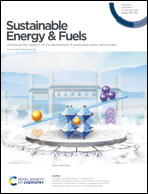Supercritical water co-liquefaction of LLDPE and PP into oil: properties and synergy†
Abstract
The major plastic wastes are always mixtures, which are difficult to separate to treat in practice. Because of some possible cross-reactions, the degradation behaviors of plastics could not be mathematically represented by a simple addition of each polymer according to their proportions. This work examines supercritical water (scH2O) to liquefy poly-ethylene and poly-propylene mixtures into an oil with special interest in the oil quality and positive effect. Linear low-density polyethylene (LLDPE) and polypropylene (PP) were chosen as parent materials because of their high proportions in plastic wastes. The results show that a high conversion rate of around 99.75% was achieved with as high as 90.7 wt% oil yield without additional catalysts or hydrogen. The scH2O co-liquefaction of the LLDPE/PP mixture was different from that of the single polymer along with an improvement in the oil yield. Cyclic hydrocarbon (i.e., cyclic) generation was promoted while the production of paraffins was hindered in scH2O co-liquefaction using a mixture of LLDPE/PP. TGA reveals that the scH2O co-liquefaction of LLDPE/PP mixtures generated more diesel and lubricant oils and less gasoline and (jet fuel + light diesel) oils, thus slightly lowering the oil quality. Overall, the supercritical fluid technology was a powerful and promising means to liquefy mixed plastic wastes into oil at a high conversion rate free of catalysts or hydrogen.



 Please wait while we load your content...
Please wait while we load your content...